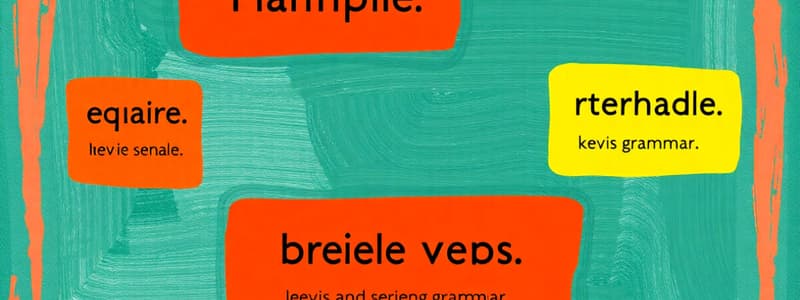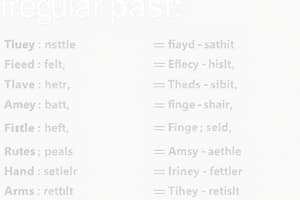Podcast
Questions and Answers
Which of the following represents the simple past tense of an irregular verb?
Which of the following represents the simple past tense of an irregular verb?
- talk - talked
- go - went (correct)
- play - played
- study - studied
Identify the sentence that is formed correctly in the affirmative past tense.
Identify the sentence that is formed correctly in the affirmative past tense.
- She did not played the guitar last night.
- He does not eat breakfast yesterday.
- They went hiking in the mountains. (correct)
- We do love to travel last summer.
Which of the following sentences is in the negative form of the simple past tense?
Which of the following sentences is in the negative form of the simple past tense?
- She didn't saw the movie yesterday.
- He doesn't played soccer last weekend.
- They did not study for the test. (correct)
- I did not went to the concert.
Which of the following correctly forms an interrogative sentence in the simple past?
Which of the following correctly forms an interrogative sentence in the simple past?
Identify the correct simple past tense form for the following regular verb: walk.
Identify the correct simple past tense form for the following regular verb: walk.
Which of the following sentences exemplifies the use of simple past tense in an affirmative form?
Which of the following sentences exemplifies the use of simple past tense in an affirmative form?
What is the correct past tense form of the verb 'drink'?
What is the correct past tense form of the verb 'drink'?
Select the sentence that properly uses an auxiliary verb in forming an interrogative sentence in the simple past tense.
Select the sentence that properly uses an auxiliary verb in forming an interrogative sentence in the simple past tense.
Which of the following correctly identifies a regular verb form in its past tense?
Which of the following correctly identifies a regular verb form in its past tense?
Which of these options contains only irregular verbs in their past tense forms?
Which of these options contains only irregular verbs in their past tense forms?
Flashcards
Simple Past Tense
Simple Past Tense
Describes actions that happened and finished in the past.
Irregular Verbs
Irregular Verbs
Verbs with irregular past tense forms.
Regular Verbs
Regular Verbs
Verbs that form past tense by adding '-ed'.
Affirmative Sentences
Affirmative Sentences
Signup and view all the flashcards
Negative Sentences
Negative Sentences
Signup and view all the flashcards
Interrogative Sentences
Interrogative Sentences
Signup and view all the flashcards
Past Tense
Past Tense
Signup and view all the flashcards
Time Expressions
Time Expressions
Signup and view all the flashcards
Simple Past Tense
Simple Past Tense
Signup and view all the flashcards
Irregular Verbs
Irregular Verbs
Signup and view all the flashcards
Regular Verbs
Regular Verbs
Signup and view all the flashcards
Affirmative Sentence
Affirmative Sentence
Signup and view all the flashcards
Interrogative Sentence
Interrogative Sentence
Signup and view all the flashcards
Past Tense Verb
Past Tense Verb
Signup and view all the flashcards
Study Notes
Simple Past Tense
- The simple past tense describes actions that happened and were completed at a specific time in the past.
- It's used to talk about completed actions or states in the past.
- It's often accompanied by time expressions like "yesterday," "last week," "in 2023," or specific dates.
Irregular Verbs
- Irregular verbs change their form in the past tense in an inconsistent manner, unlike regular verbs.
- Memorizing their past tense forms is crucial.
- Examples include:
- go - went
- have - had
- see - saw
- speak - spoke
- eat - ate
Regular Verbs
- Regular verbs follow a consistent pattern in forming their past tense.
- They usually add "-ed" to the base form.
- Examples include:
- walk - walked
- play - played
- study - studied
- love - loved
- talk - talked
Affirmative Sentences
- Affirmative sentences state something is true.
- They express a positive statement about an action or event in the past.
- Examples:
- I walked to school yesterday.
- They ate pizza for dinner.
- She played the piano beautifully.
Negative Sentences
- Negative sentences state something is not true.
- They express a denial of an action or event in the past.
- They use auxiliary verbs like "did not" or contractions like "didn't" with the base form of the verb.
- Examples:
- I did not go to the park.
- They did not eat any cake.
- She didn't play outside yesterday.
Interrogative Sentences
- Interrogative sentences ask a question.
- They are used to inquire about actions or events that occurred in the past.
- To form questions in the simple past, the auxiliary verb "did" is placed before the subject, and the base form of the verb follows.
- Examples:
- Did you go to the store?
- Did they eat dinner?
- Did she play tennis last week?
Studying That Suits You
Use AI to generate personalized quizzes and flashcards to suit your learning preferences.




